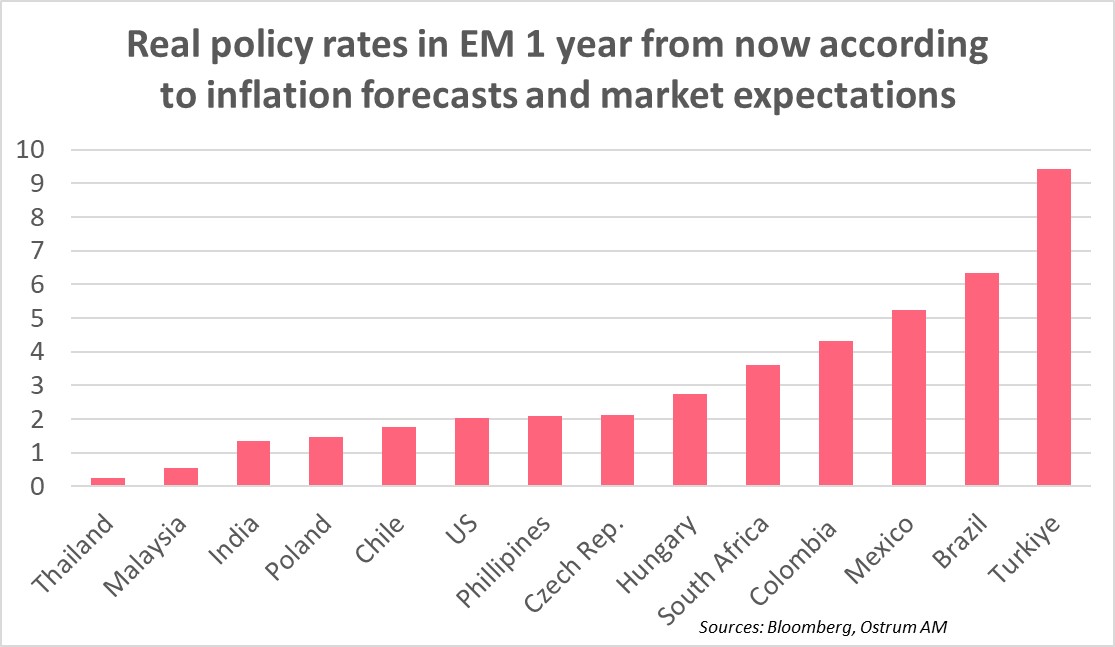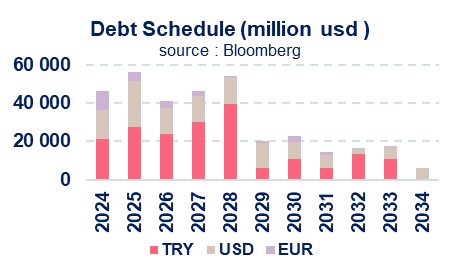Since Mr. Simsek’s appointment as Finance Minister in June 2023, Turkey has returned to orthodoxy policy, initiating a rebalancing of its economy. The sentiment towards the country has significantly improved. Fitch has upgraded Turkey’s rating by a notch to “B+” with a positive outlook. The upcoming municipal elections on March 31 will be decisive for Erdogan’s political future and for Turkey’s economic prospects.
The emerging market Strategy view
Crucial elections for Turkey’s economic prospects
Since the appointment of Mehmet Simsek as Minister of Finance, the new economic team has been working to rebalance the country’s economy on the brink of the balance of payments crisis. Since June, the Central Bank of the Republic of Turkey (CBRT) had raised its key rate by 36.5% to stabilize the lira.
However, the trend abruptly reversed at the beginning of the year. Despite the strong monetary tightening, activity remains robust, supported by negative real rates as well as non-restrictive budgetary and wage policies fueling the rebound in inflation (55.7%). The decline in foreign exchange reserves also contributed to the slide of the lira, with the exchange rate against dollar reaching a historical high at 32. Last week CBRT spent $20 billion to stabilize its currency!
Faced with rumors of a rate hike after the elections on March 31, the CBRT unexpectedly raised its main interest rate by 500 bps to 50%. The decision strengthens CBRT’s credibility, dispelling fears of political interference in its monetary policy decisions. The graph below shows the real interest rates at 12 months, assuming the inflation forecasts, and market expectations materialize.
Turkey thus recorded the highest real interest rate among the countries represented in the graph. Sovereign bond in local currency have recorded the worst performance since the beginning of the year at -10% (GBI-EM in USD). This should also reassure foreign investors who have a strong interest in the Turkish financial markets.
The Portfolio Manager view
A very fine line
The come back after last year presidential elections to a monetary policy more in line with best practices was welcomed by the markets: its debt risk premiums quickly converged to levels close to their long-term history. Given a very high short term debt burden, this pragmatism was all the more necessary and timely.

Thus, the question for investors today is primarily about the persistence and sustain-ability of these more orthodox policies, and therefore about assessing the political risk.
The country is indeed facing significant challenges: these improvements have not yet changed its debt profile; it requires much more time. However, this recent economic sit¬uation and renewed confidence have allowed the country to borrow again in international markets, which is very good news.
But Turkey is still walking a very fine line: deviating from the current trajectory would mean new substantial financial tensions.
However, continuing this path resembles a virtuous circle and could allow the country to change its economic trajectory in a sustain¬able way: by extending the duration of its debt and with lower risk premiums.
But above all, to borrow more in its own currency. This is what is currently anticipated and makes international debt still attractive.
Turkey – focus on elections
Download the insight
